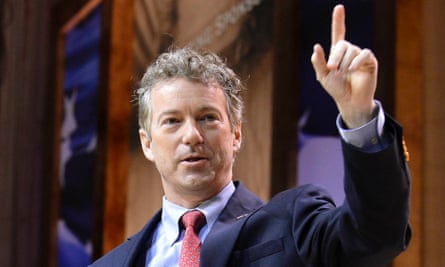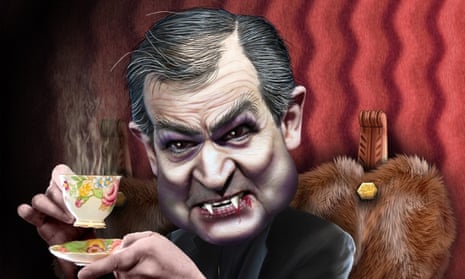Ted Cruz is riding high right now. Over the weekend, he gave a rousing anti-establishment speech at the activist-oriented Republican Leadership Conference in New Orleans, and won the event's straw poll. He also appeared on ABC's This Week to give a cathartic Hillary Clinton smack-down: "The sad thing with Secretary Clinton, is it seems to be all politics, all the time." Most significantly, the Texas GOP primaries gave the Tea Party and Cruz an important series of victories at a time when the insurgent movement's electoral future seems otherwise uncertain – even and especially in this week’s Super Tuesday primaries in Mississippi and elsewhere.
The person who should be the happiest about Ted Cruz's visibility and apparent success? Rand Paul.
The more Cruz links himself to the Tea Party and basks in national attention, the more reasonable and mature Paul looks – and the less he has to tone down his own extreme positions. Cruz and Paul are the only two possible 2016 candidates with the infrastructure and fundraising abilities that could plausibly challenge what used to be Chris Christie's advantage, which is looking weaker by the day.
Don't be distracted by straw polls. Crowd size says more about notoriety and entertainment value than political support (n.b. Palin, S; Bachmann, M). The key indicator for the Cruz-Paul matchup, at this ultra-early stage, is found in state head-to-head polls against Clinton: in the most recent polls from Iowa and North Carolina, Paul is the GOP nominee who comes the closest to besting Clinton – beating not just Cruz but Christie and Jeb Bush, too. In New Hampshire and Colorado, he's the only Republican that can beat her.
Cruz's heightened national profile has come with steady negative favorability ratings – in fact, he's never had a net positive favorability rating nationwide. Even more perilously, the feedback loop of Tea Party adoration always pushes Cruz's rhetoric into ever-more-fanciful flights of extremism. In March, he accused pro-choice advocates of being Satanists; last month, he cribbed Jack Nicholson's firey "A Few Good Men" retort in the context of a Benghazi debate, saying Democrats "can't handle the truth." It's a great line – it's also the point in the movie at which it becomes clear that Nicholson's character has confused patriotism with a blank check to commit atrocities.
Cruz's considerable ego flourishes in the spotlight, while Paul has a cagier – and more wonkily sedate – approach to grandstanding. Search the internet for wacky Rand Paul quotes. He puts his most right-wing proposals in deceptively simple language: framing the elimination of Social Security, for instance, as "I think the average American is smart enough to make their own investments." His other gaffes are in support of libertarian ideas that sound weird only in the context of being a Republican in 2014: "I think torture is always wrong," for instance, or saying he would have voted against invading Iraq.

It’s not that Paul doesn’t like the spotlight, or that gaffe-proofing yourself is the only strategy 889 days before Election Day. But two showy Senate filibusters last year neatly illustrate the divide: Paul's was, in fact, a filibuster; Cruz's speech was just that – a long speech, with his fundamental aimlessness betrayed by wildly off-topic soliloquies on everything from White Castle to Ashton Kutcher.
The Cruz bubble is built on a charismatic, if sometimes eccentric, appeal to the most conservative of the conservative base; Rand's popularity – and he came in third in that RLC straw poll – has its roots in a few strong policy positions and the ability to not come off like an asshat in public. He's also created a new kind of base: outside both ideological orthodoxy and the entrenched establishment.
The irony of Paul benefitting from being the lesser of two crazies is that, in some ways, Paul is actually the more radical of the two, the candidate most likely to pull the GOP from its moorings. Cruz rails against the party "graybeards", but he is actually a kind of stealth establishment candidate: his radical rhetoric and lack of discipline may upset the party "graybeards", but his positions are logical extensions of the traditional GOP platform.
Paul, on the other hand, is staking out new ground. His positions don't completely align with establishment GOP – nor do they fit the agenda (such as it is) of the Tea Party. He is a Venn diagram of one.
Paul's libertarianism is unapologetic; where he's strayed from GOP orthodoxy, it's largely in the direction that the American public is going – and not just his call for National Security Administration oversight (supported by 59% of Americans). On marriage equality (also supported by 59% of Americans), Paul told his party that they need to "agree to disagree". In contrast, Cruz has introduced a bill that would invalidate the federal benefits of same-sex marriages if the couple moves to a marriage-restricted state – and he asked listeners to "pray" that marriage equality rulings be reversed.
But it's not just about bending with the popular will. Paul has staked out positions outside the GOP orthodoxy that are also on the periphery of the average voter's radar. He at least admits that the Republican mania for voter ID laws is counter-productive: "Republicans need to be aware that there is a group of voters that I’m trying to court and that we should be trying to court who do see it as something directed towards them." Both Paul and Cruz advocate drug sentencing reform, but Paul backs up that gesture with the belief that felons' voting rights should be reinstated.
Look, Rand Paul is no moderate. He's pro-life and another Benghazi alarmist. He wants to privatize Social Security. He's aligned with the National Rifle Association on gun rights. But he's not really much of a Republican – and that's a good thing, if the GOP wants to survive.
Paul happens to be headed to Texas this week himself; he'll speak at the Texas State Republican convention. People forget that Paul's Texas roots are just as deep than Cruz's: his father's 37-year House career means that Paul was born and raised there. This is no small thing in a state that takes its identity very seriously. (That Texas has accepted and elevated a Cruz, a native Canadian, is perhaps the strongest proof of Cruz's political genius).
But 2016 prognosticators shouldn't pay much attention to how Paul is received – they should keep an eye on the waves he doesn't make. He could surf those calm waters far.

